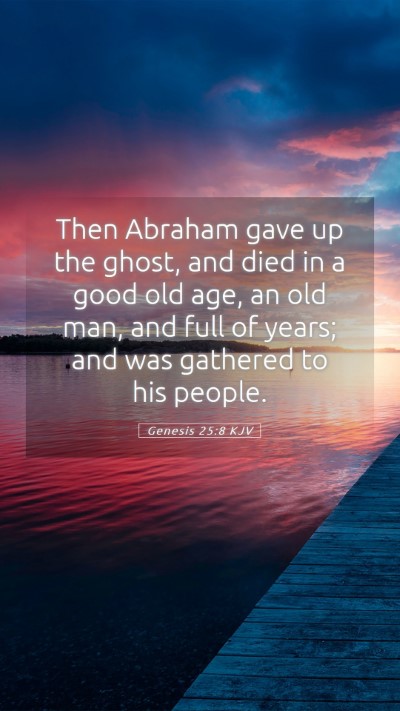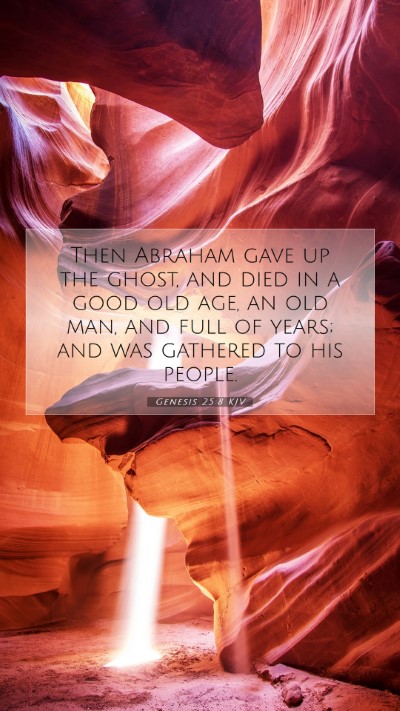Bible Verse Commentary: Genesis 25:8
Verse Reference: Genesis 25:8 - "Then Abraham gave up the ghost, and died in a good old age, an old man, and full of years; and was gathered to his people."
Overview and Context
The passage of Genesis 25:8 marks a significant moment in the life of Abraham, the patriarch of the Israelites. This verse indicates the conclusion of Abraham's life, emphasizing the concept of mortality and the hope of joining one’s ancestors after death. The narrative occurs after the account of Isaac's sons and pivotally sets the stage for the continuation of God's covenant through Isaac and his descendants.
Bible Verse Meanings
This verse holds profound meaning within the broader theological context. It reflects Abraham's character—he lived a long, fulfilling life marked by his commitment to God. According to Matthew Henry, this passage underscores the reward of a life devoted to divine purpose, encapsulating Abraham's faith journey and God's promises.
Bible Verse Interpretations
Many scholars interpret Abraham's death as a peaceful transition rather than a tragic end. Albert Barnes comments on the phrase "full of years," suggesting that Abraham not only lived long but also experienced the fullness of life that comes from a deep relationship with God. Adam Clarke further adds that "gathered to his people" implies a continuity of life beyond death, embodying the hope for the righteous.
Bible Verse Understanding
Understanding this verse involves recognizing its thematic elements: the fulfillment of God's promises, the inevitability of death, and the idea of legacy. This passage encourages readers to contemplate their lives and spiritual journeys, reminding them to focus on the eternal aspect of existence beyond earthly life's brevity.
Bible Verse Explanations
- Life Well-Lived: Abraham's life is presented in a manner that can inspire believers to pursue a relationship with God that leads to a meaningful existence.
- Death and Legacy: The mention of "gathered to his people" reflects the notion of community and belonging, both in life and after death. It suggests continuity and hope for reunion with loved ones and shared faith.
- The Promise of God: Abraham’s life serves as a testimony to God's fidelity to His promises, encouraging readers to trust in divine assurances.
In-Depth Bible Verse Analysis
In Genesis 25:8, the expression "gave up the ghost" signifies death as a release of the spirit. This phrase illustrates biblical anthropology, where humanity is seen as both physical and spiritual. Death is not portrayed as an end but a transition. Victorian and ancient interpretations of familial connections are reinforced in this verse, urging the faithful to anticipate a reunified heritage beyond the grave.
Importance in Scripture
This verse is vital not only within the context of Genesis but also relates to broader themes in the Bible regarding faith, mortality, and afterlife hopes. It connects with verses such as:
- Hebrews 11:16 - Discussing the heavenly country prepared for the faithful.
- Matthew 22:32 - Jesus affirms that God is not the God of the dead but of the living.
- Ecclesiastes 3:20 - Reflects on the return of all beings to the earth, emphasizing the cyclical nature of life.
Application of Genesis 25:8 in Daily Life
Reflecting on Abraham’s life and death provides valuable insights for contemporary believers. It exemplifies the importance of living faithfully and purposefully, ensuring one's legacy is one of righteousness and devotion. Furthermore, the passage invites individuals to explore questions about their spiritual journeys, including how they perceive death and what they aspire to achieve in their lifetimes.
Conclusion: In summary, Genesis 25:8 serves as a profound reminder of the promises of God, the significance of our life choices, and the hope for eternal life. It invites readers to engage deeply with significant biblical themes through personal reflection and communal study, ultimately encouraging an enriched understanding of Scripture.


